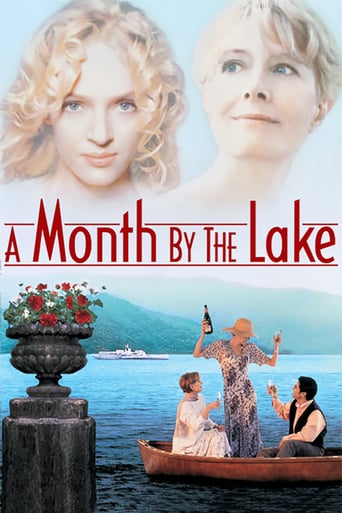spenycjo
Honestly, what a disappointment. Every. Single. Sentence. Spoken. Like. This. S-l-o-w-l-y. It made me just about jump out of my skin (and I can watch a four-hour silent movie without losing interest for a minute).I haven't written a review here in ages, but this movie needs a warning label.I've seen all three of the stars give fabulous performances so it must have been the director. Here, Redgrave's performance is so weird I couldn't figure out what she thought she was doing. Fox and Thurman could not have known what they were entrusting to the film stock-- performances in an acting style from the distant past...only slower.And the story is so clichéd - out-of-date clichés, not even current ones! - that it was painful to watch. There *can't* be any spoilers, the only element of surprise being that you can't believe the filmmakers would actually dare do anything so obvious. Watch "Enchanted April" for what this might have been.
James Hitchcock
H.E. Bates has never really been a popular author in the cinema- there have been far more adaptations of his works on television- but in 1995 there appeared both "A Month by the Lake" and "The Feast of July", the first feature films based on his writings since "Dulcima" and "The Triple Echo" in the early seventies. The reason why these two films both came out at that time is doubtless the temporary revival of interest in his works provoked by "The Darling Buds of May", the highly popular television adaptation of his "Larkin Family" series of comic novels."A Month by the Lake", based on a story from Bates' collection "The Grapes of Paradise", is set in the Italy of the 1930s; to be precise, by Lake Como in April 1937, the very month in which Edward Fox, one of its stars, was born. Rather unusually in a youth-obsessed cinema, its theme is the growth of love between two middle-aged people, both British guests at an elegant lakeside hotel. Miss Bentley is a spinster who, on the first day of her month's holiday, meets Major Wilshaw, a retired Army officer. This is not, however, a straightforward romance. Even in middle age the path of love does not always run smoothly, and complications arise in the shape of two other characters. Miss Beaumont, an American nanny working for a rich Italian family, flirts shamelessly with the Major. Vittorio, a handsome young Italian, flirts equally shamelessly with both Miss Bentley and Miss Beaumont. (Vittorio, incidentally, is the only major character whose Christian name we discover. The others, in keeping with Anglo-Saxon conventions of this era, address each other by their titles and surnames alone. Perhaps Italians were more relaxed about such matters).This film is considerably better than the film version of "The Feast of July", which turns a fine novel into a dull piece of rustic gloom and misery, but it does have its faults. The action tends to drag at times, particularly in the first half. The character of the Major changes rather abruptly; at first he seems like a rude, petulant man, especially after Miss Bentley beats him at tennis, and then suddenly becomes charming towards her. It is something of a convention in comedies such as "I Love Trouble" and "You've Got Mail" that all love affairs begin with hatred at first sight, but "A Month by the Lake" is a drama, a genre which has generally demanded a greater degree of psychological realism than has romantic comedy.Nevertheless, it is also a film which has its virtues. It may fall within the "heritage cinema" category but, despite the beauties of the scenery, it is not as visually lavish as some examples of the genre. It not only visually but also emotionally subtle. This type of cinema often demands a rather different style of acting technique than does contemporary drama for the reason that earlier generations, particularly but not only in Britain, often valued emotional self-control (the so-called "stiff upper lip") as a virtue, far more than most people would today. To display strong emotions, especially in public, was seen as a sign of weakness.To play "heritage cinema" well, therefore, demands the ability to display emotional states though subtle behavioural or verbal nuances rather than through overt histrionics. Uma Thurman, as Miss Beaumont, seems more at home here than she did in her earlier venture into historical drama, "Dangerous Liaisons". Roger Ebert points out that her character's surname means "beautiful mountain", but unlike Ebert I do not think that this is a reference to Thurman's physical height. Bates, after all, died in 1974, never knowing that his story would be filmed or that such a tall actress would be chosen to play the character. I think that he chose the name to emphasise that Miss Beaumont, beneath a surface playfulness, is inwardly cold and icy, and this is something which Thurman suggests well.Miss Bentley and Wilshaw, by contrast, hide strong emotions beneath an outward reticence. Like most British film actors of their generation (they were born within a few months of each other in 1937) Edward Fox and Vanessa Redgrave are both practised stars of historical drama- Redgrave, for example, starred in "Agatha" and Fox in "The Shooting Party"- , both possess the gift of being able to express emotion and mood subtly, and both make full use of that gift here. The result is a quiet, understated film, but nevertheless a very good one. 7/10
Brigid O Sullivan (wisewebwoman)
And for me, that's what movies are all about, whether it be the Disney Cinderella that was my first movie ever, or this last, A Month by the Lake, that is the place I want to be, in some other realm outside my own experience. And this movie fulfills that desire on many fronts and also kept me guessing from beginning to end.The performances of the cast were extraordinary in the most difficult of materials, an understated script and the repressive natures of the leads. Vanessa Redgrave -playing Miss Bentley, a beyond middle-age spinster of uncertain age - does much with this. In her outwardly almost flirtatious behaviour you catch the loneliness within, but barely. You determine she does have an interest in pursuing the major, she hears his voice in a dining room and then goes in slow pursuit but practically stands him up on the first 'date' and for no earthly reason we can determine.Edward Fox - playing Major Wilsaw a retired colonel from WW1 - has the major down pat, the peacocky walk, the clipped sentences, the fear lurking behind the eyes, all embodying the pre-war world of 1937 in Italy on Lake Como. Uma Thurman, in one of her first 'airings' plays Miss Beaumont, a young woman taking a position as a nanny to a wealthy Italian family staying at the same resort as Miss Bentley and Major Wilshaw who flirts one thinks rather cruelly with the Major leading him on in boredom but does she, we wonder, when the movie takes off in unexpected directions.Vanessa is sexy and wonderful, you sense there is an unstated other life underlying her character as there is with Major Wilshaw. Uma is the ingénue of a kind, an unmanageable young woman, incorrigible as another era would have it, sent to straighten herself out in Europe far away from disgracing her family in America. She is the innocent abroad, or is she. She assumes an avid interest in the photographs Miss Bentley takes of the young man in love with Miss Bentley (a scene contrived by Miss Bentley) and is astounded at Miss Bentley's capacity to captivate. It meanders along from there with beautiful cinematography and an unforgettable tennis game. Too slow moving for many tastes. Wonderful eccentric characters - too odd for some - played to the hilt by a stellar cast. 8 out of 10.
Rosemea D.S. MacPherson
An enjoyable movie. The scenery is beautiful as well as the photography. The outfits are really nice. Set in Italy by the Lake of Como, which looks like a still painting. Vanessa Redgrave, (Howards End) Miss Bentley goes on her holiday. She ends up falling in love with Major Wilshaw, Edward Fox, (Gandhi) after conflicting with a nanny, Miss Beaumont, Uma Thurman (The Truth About Cats & Dogs). Vittorio Balsari, Alessandro Gassman plays an Italian fellow who is really charming. Favorite scenes: Miss Bentley putting her earrings on. Major Wilsaw and Miss Bentley going swimming. Favorite Quote: " It is better to observe than been observed."

